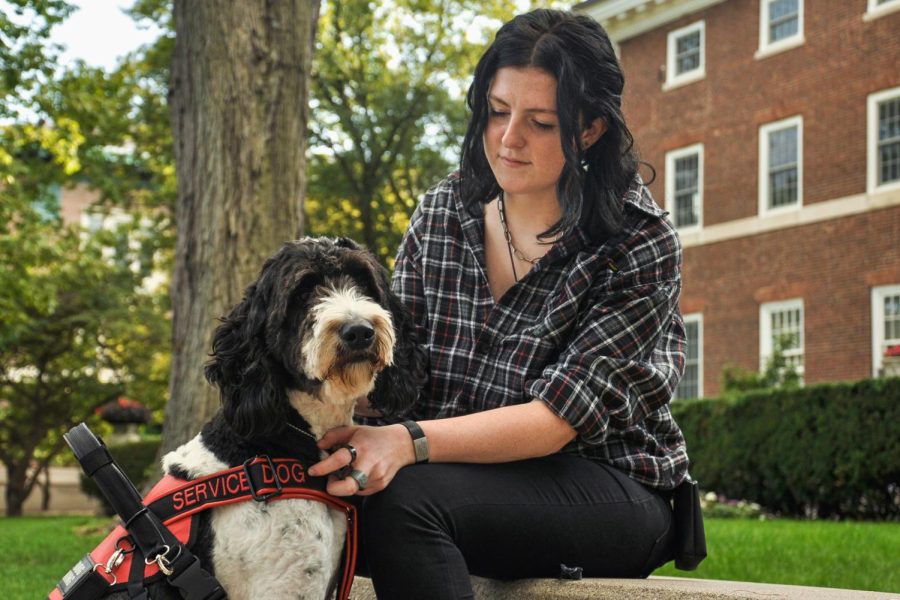Understanding the hidden frustrations of having animals on campus
Service dog and emotional support animal owners discuss their experiences with their animals on the University campus.
Chloe Griffin, junior in Social Work, pets her service dog, Sadie, on the Main Quad on Tuesday. Griffin transferred to the University and talks about how some areas around campus are better suited than others when it comes to accessibility.
Sep 8, 2022
Two roommates walk together down a dorm hallway, and people begin to stare. Chloe Griffin, junior in social work, is used to it. Although they haven’t known each other long, Griffin and her roommate, Sadie, have a close relationship and go everywhere together.
Sadie isn’t your average college roommate: she is Griffin’s service dog. With a treat bag attached to one belt loop, poop bags on another and a hands-free leash that wraps around her waist, Griffin walks with Sadie who proudly wears her vest that reads “Service Dog.”
Griffin is a transfer student, and has been enjoying the University. But, the semester has been filled with trial-and-error. She explained that some parts of campus are more accommodating than others.
“Some classes are great,” Griffin said. “There’s lots of space, there’s accessible doors, there’s room to sit. Sometimes her tail gets stepped on every class and she has to sit next to the professor because there’s no space between desks.”
Illini Service Dogs is a nonprofit organization and an RSO that houses and trains service dogs for people with disabilities. They have fundraisers, but most of their dogs have sponsors. Sarah Schum, senior in LAS, is the primary handler for Evie, who is a service dog in training.
Get The Daily Illini in your inbox!
“(Evie’s) training to be a mobility service dog,” Schum said. “She’ll be placed with somebody with a physical disability. She learns advanced mobility commands such as tugging open the fridge, tugging down zippers, tugging off sleeves, retrieving items, hitting the touch points outside of buildings, things like that.”
Since Sadie is only a year and a half old, she gets distracted by squirrels and is considered a service dog in training. But, she is well-trained and performs tasks, such as acting as Griffin’s alarm clock in the morning or alerting someone if Griffin has passed out.
Despite the benefits of having a service dog, Griffin said there is a social downside to navigating campus with a service animal.
“(Having a service dog has) almost made me an outsider,” Griffin said. “People put you on a pedestal because you’ve got this cool animal with you. People will talk to you, but it’s only for Sadie, or only for your dog. It simultaneously makes you the center of attention and persistently alone.”
Arianna Mendez, sophomore in ACES, has an emotional support rabbit living with her in the dorm. Ponyo, her small Netherlands dwarf rabbit, is popular on her dorm floor — piquing the interest of those around her. Both Mendez and Griffin provided documentation to University Housing and DRES and found the processes to be easy.
“The way to go, when it comes to emotional support animals, is getting a rough approval from a doctor, whether it’s a psychiatrist, a therapist, anyone that knows you and whatever you need it for,” Mendez said. “(It will say) this person has these conditions and having an emotional support animal will alleviate such conditions.”
Emotional support animals are not the same as service animals. Service animals are protected by the ADA, whereas emotional support animals are not.
There are two laws that protect service dog handlers: the White Cane Law and the Service Animal Access Act. These laws were placed to protect people with disabilities who need a service dog. However, many people are misinformed or abuse these laws, and there are many fake service dogs and fake emotional support animal certification sellers.
“I would be very careful about one thing, if anyone is interested in emotional support animals,” Mendez said. “There are fake organizations that say, ‘We will register your emotional support animal, so you can have certification and you can take your pet in public.’ Nobody can do that legally … unless you’re certified by the ADA.”






